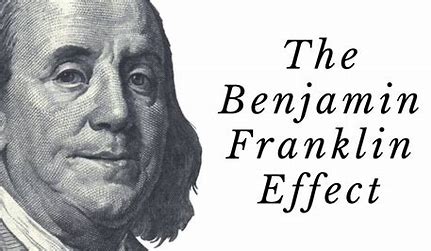Article-Detail

A Friend In Need... Inspires
As a young teenager, I was a big World Wrestling Federation (WWF) fan. I soaked up as much action as I could every chance I got. I was all about the hero and villain plot, the big costumes, and personalities. I would save up, borrow, and do whatever it took to go and see WWF live when it was in town. My favorite wrestler was Sylvester Ritter, aka, the Junkyard Dog who, in addition to being a Hall of Fame pro wrestler, he was an All American football player at Fayetteville State where he earned a degree in political science. One of my favorite villains was Bobby “The Brain” Heenan. One of his most repeated quotes was, “A friend in need is a pest”. He’d usually utter those words when someone would bring up the topic of generosity, giving, or sharing. Benevolence was not his strong suit. Heenan’s statement also runs counter to what psychologists call The Benjamin Franklin effect. The Benjamin Franklin effect says that a person having done someone a favor is more likely to do another favor for that person than they would be if they had received a favor from that person. In short, Ask someone to do you a favor, and they will like you more. Do a favor for someone, and you will like them more than if they did you a favor. It seems counterintuitive but there is plenty of research that backs it up.
Benjamin Franklin’s theory was revealed to him when he served in the Pennsylvania Legislature. He and a rival legislator were constantly at odds treating each other with disdain or complete silence. One day, Franklin heard that his rival had a book that Franklin wanted to borrow so he reached out and asked to borrow it. The rival sent it immediately. After about a week, Franklin returned it with a ‘thank you’ note. The very next day and until his death, the rival treated him with kindness and always expressed an orientation of generosity toward Franklin. In cases such as this where one person does not like another and is asked a favor, doing a favor causes what is called cognitive dissonance meaning there are feelings of hostility and good will toward the same person at the same time. These two simultaneous feelings confuses the brain and to justify the act of doing the favor, the brain tells itself that you’re doing it because you like the target of your kindness. In most cases, the Benjamin Franklin effect will override the hostility and replace it with civility.
It isn’t a one way street. In order to maximize the Benjamin Franklin effect, everyone in the relationship must give some because 1. Your efforts reduce the chance that others don’t become exhausted with ‘serving’ you, and 2. You are not a manipulator taking advantage of them for your personal ends. The Benjamin Franklin effect isn’t a bottomless pit of favors from others who are energized by the opportunity to do kindnesses for one person. That will get old and cause dissonance that will be overridden by feelings of hostility toward someone who takes and does not return anything to others. While the biggest payoff goes to the doer of good deeds, people need the gratification of knowing that someone is out there concerned for their needs too. The good will that comes with a kindness from another further fuels the desire to fulfill future favors.
The other side of the coin is also true. The Benjamin Franklin Effect goes both ways, we demonstrate kindness toward people we like by doing them favors, making us like them more, inspiring us to do more for them. People who demonstrate hostility toward people they don’t like, inspire more hostility. If we are not careful we can create a culture of hostility toward others without realizing it. Bad behavior inspires negative feelings in others which will inspire hostile behavior toward others. Kindness is the only way.
In leadership, there are always people looking to do you favors or trying to find ways to make your life a little easier. Beware of flatterers, on the surface they may seem like supporters but in reality they are working their own agenda that could include your demise. You’ll need a sharp eye and a warm heart toward flatterers, the power of the Benjamin Franklin effect can turn sycophants into friends too. A transfer of kindness (favors) between you without getting involved with their agenda will frustrate them at first but dissonance is where the Benjamin Franklin effect works best so don’t lose hope. If they don’t come around they will isolate themselves outside of the bubble you’ve created for the entire team. Kindness is the only way.
The expression Bobby Heenan used was actually a modified version of ‘A friend in need is a friend indeed’ meaning a friend who helps you when you need help is a true friend. Demonstrating kindness for others falls in line with the Benjamin Franklin effect because it inspires and strengthens connections. A friend has an email sign off that reads, “Throw kindness around like confetti’. As leaders, connections are essential for your success, so throw some confetti daily and allow them to throw some your way. People want to be happy at work, and the difference between an engaged worker and an actively disengaged worker lies in the relationship between them and their boss. Throw confetti and they’ll be inspired to not only throw it back but throw some at others too. Before you know it, your office culture will look like a superbowl celebration. Build a culture of kindness, do favors for one another and you will SOAR!
William A. Brown
May 17, 2020
https://psychologenie.com/the-benjamin-franklin-effect-explained
https://effectiviology.com/benjamin-franklin-effect/
https://journals.sagepub.com/doi/10.1177/001872676902200407




